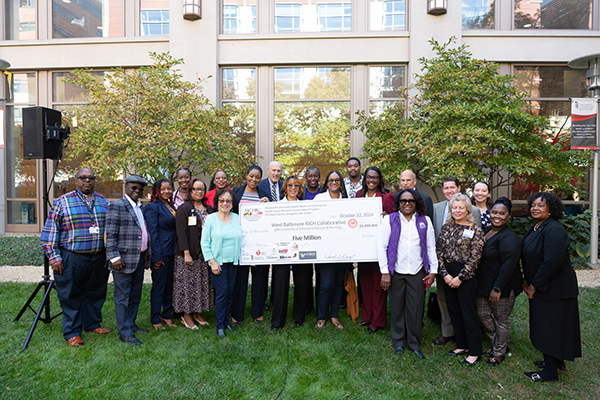From Heart Health to Mental Health: West Baltimore Residents Find Hope Through RICH 2.0 Initiative

Nearly 1.5 million Marylanders suffer from hypertension or high blood pressure, including West Baltimore resident Cynthia Ward. Over the past three years, because of the University of Maryland School of Nursing (UMSON), Ward has been able stay on top of her health and get a handle on her blood pressure.
“My blood pressure is now being monitored better today than before,” Ward said Oct. 22 at a press conference promoting the School’s work in the West Baltimore community.
UMSON has worked with community, faith-based, academic, and health care partner organizations in Baltimore City to reduce social isolation and inequities in cardiovascular health through its West Baltimore RICH Collaborative, an initiative supported by a $2.4 million Pathways for Health Equity Grant from the Maryland Community Health Resources Commission (MCHRC) awarded two years ago.
Now, thanks to a new five-year, $5 million Health Equities Resource Communities (HERC) grant from the MCHRC, UMSON will build on that success through the West Baltimore Reducing Inequities in Cardiovascular and Mental Health Collaborative - Stronger Together (RICH 2.0) initiative.
“We’re just so thrilled to have all of you join us today as we celebrate the kickoff of the West Baltimore RICH Collaborative 2.0,” said Yolanda Ogbolu, PhD ’11, MS ’05, BSN ’04, NNP, FNAP, FAAN, the Bill and Joanne Conway Dean of the University of Maryland School of Nursing, at the press conference. “This is an initiative that is dedicated to reducing health disparities in cardiovascular health and mental health.
“Heart disease stands as the No. 1 killer in Baltimore, with high blood pressure being a significant risk factor and contributor of heart disease,” continued Ogbolu, who serves as principal investigator on the grant. “Despite these alarming statistics, we know that many of our residents in West Baltimore have high blood pressure, and many of them don’t know that they have high blood pressure. It is hiding in plain sight.”
Ward first connected with the original RICH Collaborative when the program came to her church during Heart Health Month.
“After enrolling, I received a BP cuff to take home, and the community outreach team called me to check on me often and gave me advice on how to help my blood pressure. I am still checking my blood pressure every day, and I am thankful for the help that I got from the RICH program,” Ward said.
In the two years the program ran under the original grant, the West Baltimore RICH Collaborative reached 7,000 people and enrolled 2,000 in the program.
With the newest grant, RICH 2.0 will be able to extend its reach from four to seven city ZIP codes, and in addition to focusing on cardiac health, it will also include assessments for mental distress. This means community outreach workers can refer individuals not only to primary care providers but also to mental health providers.
RICH 2.0 includes an increased number of community, faith-based, academic, and health care partner organizations, including:
• A Better Tomorrow Starts Today counseling agency
• American Heart Association
• Ascension Saint Agnes Hospital
• ATOSK Health Care Services, Inc.
• B’More for Healthy Babies
• The Community Builders, Inc.
• Coppin State University Helene Fuld School of Nursing
• Druid Heights Community Development Corporation
• LIGHT Health & Wellness Comprehensive Services, Inc.
• Minister’s Conference Empowerment Center CDC
• Roberta’s House
• UMB Community Engagement Center
• UMSON
• University of Maryland School of Pharmacy
• University of Maryland School of Social Work
• University of Maryland School of Medicine
• The University of Maryland Medical Center (Downtown and Midtown)
Matila Sackor-Jones, MS, HS-BCP, executive director of partner organization Roberta’s House, a family grief support center, said her organization understands the connection between grief, mental health, and physical well-being.
“In the past year, we've supported hundreds of individuals and families dealing with the impacts of complicated grief and traumatic loss, including 227 homicide survivors,” Sackor-Jones said. “Over 60 individuals who are grieving cancer-related deaths and illnesses. Thirty-eight were grieving from overdose loss, and unfortunately, over 50 cases where grief and heart conditions like heart attacks and heart failure were intertwined.
“Our partnership with the West RICH 2.0 Collaborative allows us to address these challenges holistically, targeting both mental as well as physical health. Research shows that chronic stress, like uncomplicated grief, increases blood pressure and heart disease risk. By providing mental health supports as well as ways to manage those stresses, we can help reduce the physical impacts of stress on our individuals as well as on our communities.”
“We firmly believe that addressing the conditions in the environments where people live, learn, work, play, and age can reduce health disparities and foster social connections,” Ogbolu added. “By partnering with community-based, faith-based, and academic organizations, our collaborative has achieved a substantial collective impact far exceeding what any single organization could accomplish alone.”
For further information about RICH 2.0, please visit www.nursing.umaryland.edu/rich.